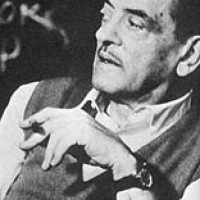CYCLE: DIRECTOR
From 21.02. To 24.02.2020.
Portraits: Terrence Malick
Luis Buñuel
22.02.1900 - 29.07.1983

Buńuel is a director, screenwriter, producer and father of the surrealist film movement. He is an avid critic of the church, traditional norms and conformism. As a child he attended a Jesuit school and later enrolled in university in Madrid where he studied literature and philosophy. At that time he got interested in film, joined the Spanish film club and wrote his first film critiques. In 1925, he went to Paris and joined the circle of surrealists, which included Salvador Dali and André Breton. He was an assistant to the director Jean Epstein on the films Mauprat (1926) and The Fall of the House of Usher (La chute de la maison Usher, 1928). In collaboration with Dali he directed the short experimental film An Andalusian Dog (Un chien andalou, 1929), a master piece of film surrealism. His next film Age of Gold (L' Âge d'or, 1930) was soon banned and most of its copies were destroyed. Afterwards he made the short documentary Land Without Bread (Las hurdes, 1933), after which he joined the Republicans. After their defeat in the Civil War in 1939, Buńuel left the country and remained in exile for a long time. In New York he worked in the Museum of Modern Art and in 1946 he accepted the offer to direct films in Mexico. His film The Young and the Damned (Los olvidados, 1950.) won an award in Cannes in 1951 and in 1956 he left Mexico and went to Paris. The first film he made in Spain after a long time was Viridiana (1961). His other important films include The Exterminating Angel (El ángel exterminador, 1962), his last short film Simon of the Desert (Simón del desierto, 1965), The Diary of a Chambermaid (Le journal d'une femme de chambre, 1964), his first film in color Beautiful of the Day (Belle de jour, 1967) that won the Golden Lion in Venice in 1967, Tristana (1970), made in Spain, The Discreet Charm of the Bourgeoisie (Le charme discret de la bourgeoisie, 1972) that received the Oscar as Best Foreign Film in 1973, and his last two films The Phantom of Liberty (Le fantôme de la liberté, 1974) and That Obscure Object of Desire (Cet obscur objet du désir, 1977).
Filmography
Cet obscur objet du désir (1977)
Le fantôme de la liberté (1974)
Le charme discret de la bourgeoisie (1972)
Tristana (1970)
La voie lactée (1969)
Belle de jour (1967)
Simón del desierto (1965)
Le journal d'une femme de chambre (1964)
El ángel exterminador (1962)
Viridiana (1961)
The Young One (1960)
La fièvre monte à El Pao (1959)
Nazarín (1959)
La mort en ce jardin (1956)
Cela s'appelle l'aurore (1956)
El río y la muerte (1955)
Ensayo de un crimen/La vida criminal de Archibaldo de la Cruz (1955)
Las aventuras de Robinson Crusoe (1954)
Cumbres borrascosas (1954)
La illusión viaja en tranvía (1954)
El (1953)
El bruto (1953)
Una mujer sin amor (1952)
Subida al cielo (1952)
La hija del engaño (1951)
Susana (1951)
Los olvidados (1950)
El gran Calavera (1949)
Gran Casino (1947)
Las hurdes (1933)
L' age d'or (1930)
Un chien andalou (1929)